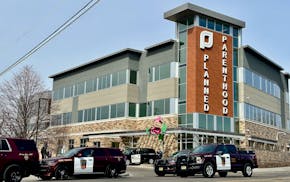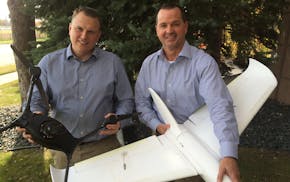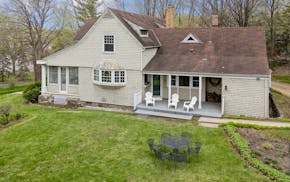Every studio has a story, Andy Berg likes to say about the spaces he builds out of old shipping containers. On a recent blustery spring day, Berg was on the hunt for a new story.
With wife Sarah tagging along for the first time, Berg gazed across stacks of multicolored containers at a 12-acre facility north of downtown Minneapolis, and took off down one of the massive corridors of steel in search of his next building project.
"It's kind of like shopping for a used car," Berg said. "I can deal with bumps and rust. The biggest challenge is if they're moldy."
Berg is still new at this. But since quitting his civil engineering job in October to launch Latitude Studios, he's convinced there's a market for turning the plentiful and relatively inexpensive shipping containers into backyard studios, lakeside hangouts and anything else a customer can dream up.
"It is like putting a bunch of Legos in front of someone," Berg said. "Everyone has different ideas about what they would create."
With a service life of 10 to 15 years, each container is unique. Some will make just a single trip across the ocean. Others might make 20 to 25 trips packed with 48,000 pounds of goods and stacked on giant ships.
Their journeys are sometimes logged from port to port and rail station to rail station. That's where the stories come in, before Berg and his circular saw give the retired boxes new life.
Musing in the camper
Berg got his idea for the business last summer after turning his backyard camper trailer into a remote office during the coronavirus pandemic. Sarah, an early childhood special education teacher, was also figuring out how to work from home while juggling family life with their 8- and 10-year-olds.
"In the morning I could open the windows and door and feel like I was outside," Berg said. "The experience was so different from fighting for space and quiet in the house."
The more he worked out of that backyard trailer, to which he added an air conditioner and other amenities, the more Berg felt that he was on to a good business idea.
"The pandemic is going to shuffle the decks of the status quo on a lot of things," he said. "Even when people go back to work, there will be a percentage of people who will continue to work remotely. They will need a home office."
Within months, Berg had turned in his notice on a 15-year career as a civil engineer. But it didn't take long for his vision to collide with the realities of a startup founder.
Berg took his business plan to at least six banks, learning quickly that with no customers, record of profits or steady income, he was out of luck on a loan.
He hit a similar wall trying to find warehouse space to start building prototypes.
"It's like trying to convince someone to rent you a house when you don't have a job yet," Berg said. "There was a lot of rejection."
Berg sold a side-by-side ATV and his 24-foot "dream boat," then bought a kayak. The Bergs refinanced their home and prepared to dip into savings and retirement accounts.
Berg began offering potential landlords four months of rent up front, which at least got their attention. The day after he walked away from his corporate job, he finally landed a lease for warehouse space in Ham Lake.
Things moved quickly from there. A 15-year career with Kimley-Horn and Associates as a civil engineer and land project manager had prepared him well to work with clients, contractors, timelines and budgets, he said.
He hired Textile Creative Studios, a marketing firm with outposts in Minneapolis, St. Cloud and Dallas, to come up with the company logo, branding and marketing strategy.
Sarah Berg, a talented interior designer, took to social media to document the building process, tagging her husband with the Instagram handle @container_cutter.
The couple wrote blog posts for the Latitude Studios website and posted time-lapse photos of the backyard office coming together, eye candy for home-design enthusiasts.
Berg hired a local craftsman to help on the design and building, and ideas flew in real time with HCM Architects as Berg learned by trial and error.
"The hardest thing working with a shipping container is that you're dealing with the corrugated steel. Nothing is flat," he said. "We needed doors and windows built to code and watertight."
He spent $1,000 on a tool to bend metal to make flashing. He also took out a bank loan to buy a $40,000 remote-control "shed mule" that will maneuver the studios into small spaces.
Basic to Tiki
Latitude Studios is just getting started, but queries are coming in from people with a range of ideas: a Michigan co-working space that can't keep up with demand; a retailer that sells Minnesota-only items; a coffee-shop owner in Iowa who wants a full-sized container to roast beans on one side and run a drive-through on the other; a Vrbo owner in Phoenix interested in a studio for a poolside oasis with storage.
All studios will be made to order, with a four- to six-week lead time.
A backyard office with heat and air conditioning, bamboo flooring and shiplap paneling will cost between $20,000 and $30,000 plus delivery, with the higher-end models including a rooftop deck.
A simple screen porch costs between $6,000 to $8,000, a backyard bar in the $12,000 to $15,000 range.
The island-themed model Berg built at the warehouse, which the couple dubbed the TikiTainer, is a tricked-out version with a live-edge walnut tabletop, refrigerator and remote-controlled LED lighting and sound system. It is priced at $12,000.
Most models plug into a standard 110-volt electric outlet, and solar panels are an option.
Latitude tries to source locally and sustainably where possible, buying from Siwek Lumber in northeast Minneapolis and Coremark Metals downtown. Berg's next-door-neighbor at the Ham Lake warehouse, Gunner Insulation, does the spray foam.
Jeff McClure, a longtime friend who is married to Sarah Berg's cousin, said he hopes to buy multiple studios next year for beer stands and double-decker hangout spots at Utepils Brewing, where he is sales director and one of four owners.
McClure said he would have been interested in the studios even without the family connection.
"The beautiful thing about Sarah and Andy working together — she's super creative and thinks outside the box," he said. "She'll push him to do things he might not do, but that consumers will ask about. They both push each other's boundaries as business owners."
Crowded market
Latitude Studios will need to find its way through a marketplace filled with niche players who sell their products regionally, locally and even on Amazon.com. Modern, prefab sheds have been around for years, customizable for use as she sheds, sporty man caves, yoga studios and hangouts for kids.
Minneapolis-based Blackbox Container Studios has been fabricating custom shipping containers across the Midwest for the past five years, building homes, pro shops for disc golf, workout gyms, music studios, cabins and home offices. Founder Shane Schaaf said the arrival of competitors adds credibility to the market.
"The market for sustainable living and modern design, coupled with the tiny house movement and a need for accessory dwelling units has opened the door for solution-based construction methods," Schaff wrote in an e-mail.
Shipping containers, Schaff said, "offer an environmentally friendly yet cutting-edge advantage over standard building techniques."
But working with them isn't easy and big ideas don't always fly. Permitting and feasibility can be a challenge.
A developer in 2014 floated an idea to build a three-story office building out of 60 40-foot containers. It got media attention but went nowhere.
Shopping in the stacks
Berg is starting small, cutting 8- by 20-foot containers in half. He finds them at TKI Intermodal, a third-generation, family-owned business in northeast Minneapolis.
The containers arrive at TKI by train, and after a 17-point inspection, are graded and priced.
A container that makes a single journey from China is considered "new" and can fetch $3,700 for an 8- by 20-foot box. A midgrade might cost $2,700. A larger 40-foot container with unusual features, such as a door on the front rather than sides, might be priced around $7,300.
TKI sales manager Darin Sogge deals mostly with large shipping companies, but farmers, construction companies, paintball operators and builders such as the Bergs are frequent customers.
"You tell me what it is you have in mind," Sogge said, "and I can take you where you need to go."
With his wife's blessing, Berg selected a green container, with the name of Korean shipping company Heung-A painted in white on the side. A metal plate on the door shows it was built in January 2006 in Seoul.
Within hours, the container was on a flatbed truck headed for the warehouse, where Berg would get to work on infrastructure and details, such as charring the cedar or pine framing using a Japanese burning method that preserves the wood and gives it a dark stain.
With models ready to show and sell, Berg is preparing to launch Latitude Studios into its next phase, with an advertising budget of $20,000. He's prepared to pay penalties to dip into his retirement savings if that's what it takes.
"I'm turning 40 this summer," he said. "So, midlife crisis, pandemic — it just makes you want to enjoy things and go on an adventure. All of those factors said to me it's time to do it."

Planned Parenthood North Central States to lay off 66 workers, restructure presence in Minnesota

John Deere buys St. Paul precision ag company Sentera
New virus is wiping out Minnesota turkey flocks, costing farmers $112M so far

Part of the family for 75 years, 19th-century house near Lake Minnetonka listed at $2M

